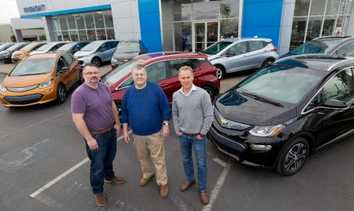 Chevy publicity photo of the first three Bolt customers. Note all the Bolts on the lot!
Chevy publicity photo of the first three Bolt customers. Note all the Bolts on the lot! Last week, Chevy delivered Bolt EVs to its first three customers in Fremont, California, home of Tesla. The rest of the Bolts pictured at left were not destined for customers; they went to local Bay Area dealers as test drive vehicles. Scott Jobe, GM of Capital Chevrolet left the announcement event and drove a fully loaded orange Premier Bolt (complete with Infotainment Package, Driver Confidence II Package, and Fast Charging) to his dealership in San Jose. Within minutes of his arrival, Kevin Rodriguez, our incredibly responsive sales rep, called us to offer a test drive. Yesterday we took the Bolt out for 30+ minutes of varied driving.
I'll be posting at least two more blogs about the Bolt after we receive ours (hopefully this coming week), but here are our first impressions including very preliminary pros and cons. For more information on the Bolt, check out We Ordered a Chevy Bolt. Pricing, Features, and Availability, my previous post about the Bolt.
Also, you should know that we are no strangers to EVs. We have owned a Ford Focus EV for the past three years and have learned quite a bit about the advantages and disadvantages of driving an EV. For more on our Ford Focus EV, see Our #EV (Electric Vehicle), Pros and Cons.
The Test Drive
Karen manually adjusted the driver's seat and declared it quite comfortable. I rode shotgun.
Anxious to get driving, we only took a few minutes to explore the 8" driver information panel and the 10 inch center console display, but at first glance, they seemed intuitive. It was easy to navigate between phone, entertainment, camera, and other features on the console. While the console, phone and infotainment systems are far superior to the Focus, I must admit to prefering the analog speedometer of the Focus.
We were very curious about the surround vision feature. I'd read that it gives you a virtual bird's-eye view of the car from above but I didn't see how that was possible. But in fact, looking at the image, it does indeed appear that there's a camera placed 30 feet above the car. You see the car and everything around it. It operates while backing up and while going forward at low speeds - 8mph or less according to Kevin. It will certainly be useful when parking or maneuvering in tight spaces where you might not see objects to the front or side.
Of course, there isn't really a camera 30' above the car - no personal drone yet. Instead, the Bolt has cameras on the front, sides, and rear of the car which it combines to create a virtual image. The giveaway was that the car in the image appeared white while ours was that beautiful orange color (not my favorite).
Another feature we were excited to see was the rear view mirror camera. While the Bolt does have a back-up camera, the Premier edition's rear view mirror itself optionally displays what's behind you via the rear camera while you are driving. This could be useful when the car is loaded and you can't see out the back, and perhaps during daytime driving since it shows more than the standard mirror can. Karen felt that it needed to be positioned correctly to avoid reflections from the back seat and glare. For me, it was a bit disconcerting, but I think I could get used to it.
Before leaving the dealership, I noted that the driver information display indicated 192 miles of range, 150 miles on the odometer, and an average energy consumption of 3kWH per mile. That seemed a bit low (238 mile range on a 60kWH battery should yield closer to 4kWh per mile). But we didn't know how the car had been driven and didn't spend any time on this.
Karen pulled out of the dealership and we were pleased to discover that unlike the Focus, whose front wheels spin easily because of omni-present 100% torque and placement of the battery (under and behind the rear seats), the Bolt started smoothly. We headed towards the freeway and Karen tried to get used to the regen braking in Low mode as we stopped at lights. The Focus didn't give the driver any control over regen. If you were coasting, it regened. I suspect that although the Bolt is less intuitive in this regard, this is how they get such great range on a 60kWH battery.
Reaching the onramp, the Bolt accelerated smoothly, merging into traffic as easily as our Audi Allroad - the 0-60 acceleration times are comparable. The ride on the highway was smooth and the car handled well. Our only concern was that the wind noise was louder than we expected.
Karen left the highway after a few miles, parked in a shopping center, and we switched places. The rear camera gives you optional parking assist lines and warnings as people and vehicles pass behind you. Maneuvering around the busy parking lot was quick and responsive as we avoided holiday shoppers who weren't paying attention.
Out on the surface streets, it was my turn to try to get used to the single-pedal driving. I'm sure we'll get there with more practice. I found the Bolt to handle extremely well around corners - much better than the Focus, and was very pleased with its turning radius (we often had to do three-point turns in the Focus).
We headed back to the dealership and upon arriving, while we had probably driven 7 or 8 miles, I noted that the range still indicated 192 miles.
We asked Kevin about Navigation, and he said that Chevy had told him the Bolt would not have Nav in the future. People prefer to use their phones (which connect to the console through Android Auto or Apple Car Play). And while it's true that we often use Google Maps instead of our Nav systems. When we're out of cell range (which happens often for us), we rely on our cars' Nav systems. I admit to being disappointed that the Bolt would not add Nav as a software upgrade in the future.
People were waiting to test drive the Bolt so we didn't get to spend any time with the console and information display. I would have liked to see what the configuration options were like for energy consumption tracking.
Here are a few very preliminary pros and cons compared to the Ford Focus EV based solely on our test drive experience:
Pros
Smooth start - the torque does not cause spinning wheels.
Comfortable ride.
Very good handling - tight, solid, but comfortable.
Excellent turning radius.
Intuitive controls and displays.
Cool surround vision.
Great visibility.
Clever headrest adjustments.
Extremely roomy for passengers and cargo, excellent legroom and leg width, excellent headroom, front and back.
Convenient place for purse under the dash, in front of the shifter.
Cons
Not quite as luxurious as you might expect for a Premier model.
A bit louder than expected on the highway.
No Navigation system (must use Android Auto, Apple Car Play, or Onstar)
Rear view mirror camera will take some getting used to.
We haven't said anything about range, charging, etc., because we really didn't get to test these aspects of the Bolt. That will wait until we get our own Bolt. According to Kevin, the dealership is expecting 55 Bolts in the next week or so and we're number 11 on the list. I'll do a post on our full impressions after we get ours and will follow it with another post about our experiences on our first 'long range' trip which we're planning for January.
We loved our Focus. For us, in spite of its range limitations and handling issues, it was a great first step into the world of EVs. We saved a lot of money on gas, only filling the Audi when we had longer trips to take.
Three years later, we're excited that the Bolt has leaped into the next generation of affordable EVs. We hope we're well on our way to a zero emissions future and elimination of our dependence on gasoline.
Update - here are blogs about our new Chevy Bolt:
We Love our Chevy Bolt!
Our Bolt EV's First Longer Trip and Fast Charging Surprises
Can a #BoltEV be your Primary Vehicle?
BoltEV from California to Oregon for the eclipse with mi/kWh between I-5 charging stations



 RSS Feed
RSS Feed